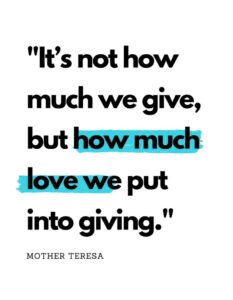Faith in Action: Giving Back to the Community
Charity is giving and helping those who do not have, are faced with one challenge, or are in need. These people in need could be people suffering from disabilities, the homeless, or orphans.
Charity is an important act; regardless of religion, it is deeply rooted in teachings and practices. It serves as a moral obligation for believers, encouraging them to assist those in need and foster a sense of community. This write-up explores how both religions emphasise the importance of helping the less fortunate and teaching the essence of charity.
In Christianity, charity is referred to as “love in action.” The Bible talks about this through various passages, notably in Matthew 25:35-40, where Jesus states, “For I was hungry and you gave me something to eat; I was thirsty and you gave me something to drink; I was a stranger and you invited me in.” This Bible verse illustrates that acts of kindness towards those in need are equivalent to serving Christ himself. A good example of this can be seen in the story of the Good Samaritan (Luke 10:25-37).

In this parable, a Samaritan helps a wounded traveller, demonstrating that true neighbours are those who show compassion, regardless of societal divides. This story encourages Christians to extend their hands to the less fortunate, breaking down barriers of prejudice and indifference.
Giving is not obligatory but is encouraged as a means to earn spiritual rewards. For instance, in Islam, the Prophet Muhammad said, “The best charity is that which is given when one is in need and struggling” (Sahih Bukhari).
A good example of this can be through community initiatives like food drives or soup kitchens. Many Muslims and Christians come together during Ramadan or Lent to provide meals for the homeless, showcasing their commitment to helping those less fortunate during significant times of the year.
Moreover, both faiths advocate for compassion and empathy towards the less fortunate. In Christianity, the concept of “love thy neighbour” is central to its teachings.
This is evident in the story of the Widow’s Offering (Mark 12:41-44), where Jesus praises a poor widow who donates two small coins, emphasising that her contribution, though small, was significant because it came from her heart. This encourages Christians to recognise the value of every act of kindness, regardless of the amount.
In conclusion, through teachings, stories, and practices, both religions encourage their followers to engage in acts of kindness and generosity. Christians are called to embody love in action, as exemplified by the Good Samaritan. By fostering compassion and empathy, both faiths teach the value of community and the transformative power of charity in creating a more just and caring world. Ultimately, the call to help the less fortunate transcends religious boundaries, reminding us all of our shared humanity and the importance of lifting each other.
READ: Surviving Harmattan: Tips For Healthy Skin & Airways
Content Credit| Igbakuma Rita Doom
Picture Credit | https://www.linkedin.com/pulse/problem-muslim-charity-giving-faisal-amjad




